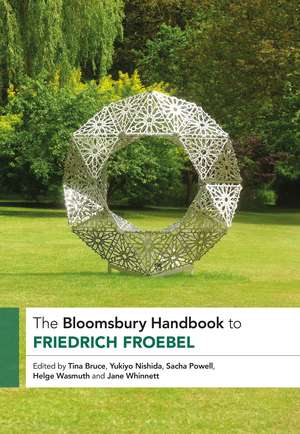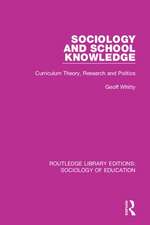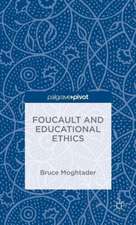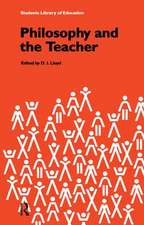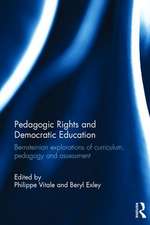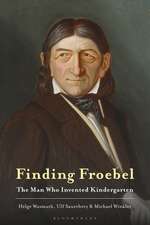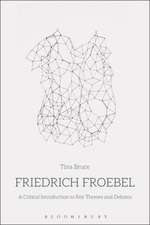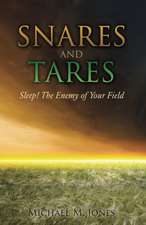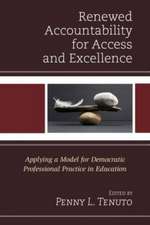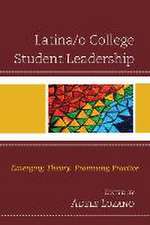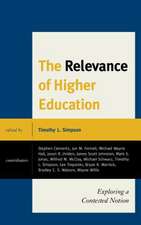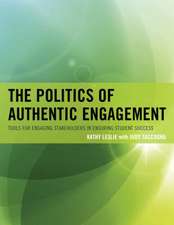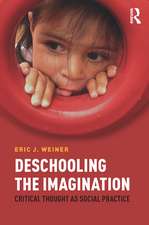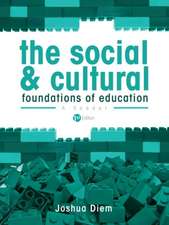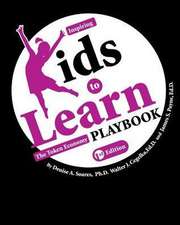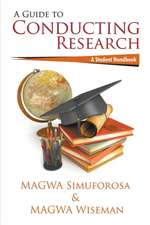The Bloomsbury Handbook to Friedrich Froebel: Bloomsbury Handbooks
Editat de Professor Tina Bruce, Dr Yukiyo Nishida, Dr Sacha Powell, Professor Helge Wasmuth, Jane Whinnetten Limba Engleză Hardback – 29 noi 2023
Din seria Bloomsbury Handbooks
- 41%
 Preț: 208.30 lei
Preț: 208.30 lei - 43%
 Preț: 640.21 lei
Preț: 640.21 lei - 44%
 Preț: 673.52 lei
Preț: 673.52 lei - 45%
 Preț: 141.20 lei
Preț: 141.20 lei - 43%
 Preț: 637.37 lei
Preț: 637.37 lei - 39%
 Preț: 696.17 lei
Preț: 696.17 lei - 41%
 Preț: 208.38 lei
Preț: 208.38 lei - 43%
 Preț: 679.49 lei
Preț: 679.49 lei - 43%
 Preț: 635.92 lei
Preț: 635.92 lei - 44%
 Preț: 626.47 lei
Preț: 626.47 lei - 41%
 Preț: 208.18 lei
Preț: 208.18 lei - 43%
 Preț: 197.67 lei
Preț: 197.67 lei - 41%
 Preț: 207.06 lei
Preț: 207.06 lei -
 Preț: 129.81 lei
Preț: 129.81 lei - 39%
 Preț: 680.07 lei
Preț: 680.07 lei - 44%
 Preț: 673.52 lei
Preț: 673.52 lei - 43%
 Preț: 638.78 lei
Preț: 638.78 lei - 39%
 Preț: 682.82 lei
Preț: 682.82 lei - 21%
 Preț: 278.65 lei
Preț: 278.65 lei - 43%
 Preț: 631.68 lei
Preț: 631.68 lei - 43%
 Preț: 632.61 lei
Preț: 632.61 lei - 44%
 Preț: 626.47 lei
Preț: 626.47 lei - 43%
 Preț: 637.84 lei
Preț: 637.84 lei - 45%
 Preț: 137.40 lei
Preț: 137.40 lei - 44%
 Preț: 141.67 lei
Preț: 141.67 lei - 43%
 Preț: 824.17 lei
Preț: 824.17 lei - 12%
 Preț: 198.96 lei
Preț: 198.96 lei - 43%
 Preț: 633.96 lei
Preț: 633.96 lei - 43%
 Preț: 731.21 lei
Preț: 731.21 lei - 43%
 Preț: 640.88 lei
Preț: 640.88 lei - 43%
 Preț: 679.85 lei
Preț: 679.85 lei - 43%
 Preț: 632.80 lei
Preț: 632.80 lei - 10%
 Preț: 218.15 lei
Preț: 218.15 lei - 43%
 Preț: 685.76 lei
Preț: 685.76 lei - 43%
 Preț: 688.12 lei
Preț: 688.12 lei - 43%
 Preț: 631.97 lei
Preț: 631.97 lei - 44%
 Preț: 626.47 lei
Preț: 626.47 lei - 21%
 Preț: 897.24 lei
Preț: 897.24 lei - 12%
 Preț: 201.62 lei
Preț: 201.62 lei - 44%
 Preț: 721.05 lei
Preț: 721.05 lei - 43%
 Preț: 683.36 lei
Preț: 683.36 lei -
 Preț: 821.51 lei
Preț: 821.51 lei - 44%
 Preț: 626.47 lei
Preț: 626.47 lei - 44%
 Preț: 814.68 lei
Preț: 814.68 lei - 21%
 Preț: 228.89 lei
Preț: 228.89 lei - 43%
 Preț: 686.61 lei
Preț: 686.61 lei
Preț: 634.04 lei
Preț vechi: 1116.05 lei
-43% Nou
Puncte Express: 951
Preț estimativ în valută:
121.32€ • 127.13$ • 100.30£
121.32€ • 127.13$ • 100.30£
Carte disponibilă
Livrare economică 21 martie-04 aprilie
Preluare comenzi: 021 569.72.76
Specificații
ISBN-13: 9781350323209
ISBN-10: 1350323209
Pagini: 504
Dimensiuni: 169 x 244 x 35 mm
Greutate: 0.82 kg
Editura: Bloomsbury Publishing
Colecția Bloomsbury Academic
Seria Bloomsbury Handbooks
Locul publicării:London, United Kingdom
ISBN-10: 1350323209
Pagini: 504
Dimensiuni: 169 x 244 x 35 mm
Greutate: 0.82 kg
Editura: Bloomsbury Publishing
Colecția Bloomsbury Academic
Seria Bloomsbury Handbooks
Locul publicării:London, United Kingdom
Caracteristici
Includes discussion of a range of topics including religious education, architecture, neuroscience and peace education
Notă biografică
Tina Bruce CBE is a Froebel trained teacher and Vice President of BAECE: Early Education. She is the author of Friedrich Froebel: A Critical Introduction to Key Themes and Debates (Bloomsbury, 2021).Yukiyo Nishida is Lecturer of Early Childhood Education at the University of Aberdeen, UK. Sacha Powell is CEO of the Froebel Trust, UK, a charity that supports research and practice development in early childhood education based on Froebelian principles.Helge Wasmuth is Professor of Early Childhood and Childhood Education at Mercy College, USA. He is co-author of Finding Froebel: The Man who Invented Kindergarten (Bloomsbury, 2023).Jane Whinnett MBE is a former nursery headteacher, Froebel Trust Travelling Tutor and an Associate Tutor for University of Edinburgh, UK.
Cuprins
TributeIntroduction: Connections, Disconnections, Reconnecting and Interconnecting, Tina Bruce (University of Roehampton, UK)ReflectionsFroebel for Me, Aili HeleniusWhat Froebel Means to Me, Louis Werth (University of Cambridge, UK)Part l: Connections - Searching for the Authentic Friedrich FroebelEditor's Introduction, Helge Wasmuth (Mercy College, USA)1. Translating Pedagogy - Reading Froebel in Different Languages, Sebastian Engelmann (University of Education Karlsruhe, Germany)2. Froebel's Law of the Sphere as a Theoretical Groundwork for his Pedagogy, Michael Winkler (University of Jena, Germany)3. Froebel's Mathematical Thinking, German Idealism and the Occupation of Plaiting, Michael Friedman (Tel Aviv University, Israel)4. Between Theory and Educational Approach: Anthropological Presumptions and Basic Terms of Froebel's Pedagogy of Play, Ulf Sauerbrey (University of Applied Sciences in Neubrandenburg, Germany)5. Friedrich Froebel's Mutter- und koselieder and Its Importance Today, Christiane Konrad (Germany)6. Archival Holdings on Friedrich Froebel and the Edition of His Letters, Bettina Irina Reimers (Bibliothek für Bildungsgeschichtliche Forschung) and Stefan Cramme (Bibliothek für Bildungsgeschichtliche Forschung)7. A Discussion of Fröbel From Authentic to Modern, Isabel Schamberger (Friedrich-Froebel Museum, Bad Blankenburg, Germany)8. Peace as Unification of Life - Peace Building as Hidden Curriculum in Froebel's Education of Man, Karl Neumann (Technische Universitet Braunschweig, Germany)Part II: Disconnection and Transitology (The Transfer, Translation and Transformation of Froebelian Study and Practice)Editor's Introduction, Yukiyo Nishida (University of Aberdeen, UK)9. Discoveries at the Back of the Kindergarten Cupboard, Helen May (University of Otago, New Zealand)10. Pioneering Froebelians and the Kindergarten Movements in Italy, Keiko Omri (Kwansei Gakuin University, Japan)11. From Keihau to the UK: Eleonore Heerwart's Role in Establishing Froebelian Pedagogy in Britain From 1861 to 1883, Jane Read (University of Roehampton, UK)12. Grace Fulmer and Conservative and Liberal Approaches to Froebelian Education, Larry Prochner (University of Alberta, Canada)13. The American Froebelians, Ann Taylor Allen (University of Louisville, USA)14. Morality, Beauty and Froebel: Cultural Philanthropy and the Establishment of Free-Kindergartens in Australia, Luke Touhill (Macquarie University, Australia)15. The Route to the Hebrew Kindergarten in the Early 20th century, Yael Dayan (Hebrew University of Jerusalem, Israel)16. The Froebelian Garden in Spain, José Pedro Marín Murcia (Complutense University of Madrid, Spain) and Maria Jose Martinez-Ruiz-Funes (University of Murcia, Spain)Part lll: Reconnecting - Exploring and Working Through the Challenges of Current PracticeEditor's Introduction, Jane Whinnett (University of Edinburgh, UK),17. Getting Down and Dirty with Froebel on the Allotment, Kate Razzall (Endorsed Froebel Trust Travelling Tutor, UK)18. Pollinating Minds at Guildford Nursery School and Family Centre: A Froebelian Approach, Sally Cave (Froebel Trust Hub, UK)19. Exploring Interconnectivity Between Froebelian Principles and Australian Aboriginal Ways of Knowing, Being and Doing, Libby Lee Hammond, (Purnululu Aboriginal Independent Community School, Western Australia), Elizabeth Jackson-Barret (Edith Cowan University, Australia) and Stella Louis (Early Childhood Consultant, UK)20. Hope Cottage Nursery School - A Year of Nature and Sustainability in the Age of Climate Crisis: A Journey In Progress, Natasha Stewart21. #Blocks Rock, Catriona Gill (University of Edinburgh, UK)22. Blocks in Bhutan, Margaret Brooks (University of New England, Australia) and Chimi Demi (Paro College of Education, Bhutan)23. Froebelian Approaches in Primary School: A Case Study of Topic-Based Learning in the Primary Phase at Annan School, Alastair Leigh (Annan Froebel School, UK) with an Introduction by Mark Hunter (Annan Froebel School, UK)24. The Glory Kindergarten and Peace Education, Fusa Abe and Ran Shirai (The Glory Kindergarten, Japan)25. The Power of Partnership: Linking Froebelian Practice and Connecting Practitioners Across Early Learning Centres and Primary Settings in Midlothian, Scotland, John Dagger (Moorfoot Primary School North Middleton, UK) and Kerry Knight (Burnbrae Primary School, Midlothian, UK)26. Learning From Our Children: The Story of Eilidh, Lynn McNair (University of Edinburgh, UK)27. Family Songs at Home: A Multiagency Approach to Supporting Children and Families Through Digital Media Using Froebel's Mother Songs, Donna Green (Froebel in Falkirk Lead, UK)28. Developing Froebel's 'Instinct into Insight': A Play Therapist Supports Families to Grow and Find Solutions to Their Own Challenges, Elaine Fullerton (Play Therapy Base, Midlothian, UK)Part lV: Interconnecting - Exploring and Finding Links Between the Essentials of Froebelian Principles and Practices and Current Research and TheoriesEditor's Introduction, Sacha Powell (The Froebel Trust, UK)29. Pedagogies of Care with 1-year-olds: A Contemporary Froebelian Lens in New Zealand, Maria Cooper and Jean Rockel (University of Auckland, New Zealand)30. A Froebelian Approach to Making Theatre for the Very Young, Samantha Lane (Angel Theatre for Children, UK)31. A Life 'In and With' Nature in the Period of Earliest Childhood, Jo Josephidou (The Open University, UK) and Nicola Kemp (University of Canterbury, UK)32. From 'Real Spaces' to 'Other Spaces' in Young Refugee Children's Free-Flow Play, Sandra El Gemayel (University College London, UK)33. The Encounter of the Froebel Blocks and the Giant-Sized Blocks, Fredrika Visuri and Susanna Gilberg (Ebeneser Foundation Kindergarten Museum, Finland)34. Pedagogies of Hope: Exploring Play Opportunities for Young Children in an Urban Environment, Marlene McCormack, Aishling Silke, Annette Kearns, Leah O'Toole, Patsy Stafford, Tríona Stokes and Mathias Urban (Maynooth University, Ireland)35. The Roots of Froebelian Arts and Skills Pedagogy in Memorised Narratives about Finnish Early Childhood Education and Teacher Education From the 1920s to the 1990s, Inkeri Ruokonen (University of Turku, Finland) and Taina Sillanpää (Ebeneser Foundation Kindergarten Museum, Finland) 36. The Art of Serious Play: Froebel's Influence on Early Childhood Pedagogy and Beyond to the Creative Work of Artists and Designers, Pete Moorhouse (Early Years Creative Consultant)37. Off the Grid: Insight into Design's Inner and Outer Landscapes, John M. Reynolds (Miami University Architecture and Interior Design, USA)38. Spirituality in Early Childhood Pedagogy: a Froebelian Lens on the Role of Women in a Chinese Context, Fengling Tang (University of Roehampton, UK) and Juan Zhao (Hebei University, China)39. The Realisation of 'Life Unity' in the Mother Songs, Yumiko Taoko (Ryukoku University Junior College, Japan)40. Educating Hearts and Minds in Early Childhood Education: The Importance of Social-Emotional Learning, Alessandra Arce Hai (Universidade Federal de São Carlos, Brazil)41. Stirring the Embers: Exploring the Spiritual Foundations of Froebel's Concepts, Teresa K. Aslanian (University of Southeastern Norway, Norway)42. The Passage of Time in the Scottish Froebel Story, Aline Wendy Dunlop (University of Strathclyde, UK)43. Spatiality in Finnish Early Childhood History and its Connections to Finnish Pedagogy - A Closer Look at the Kitchen Area, Taina Sillanpää (Ebeneser Foundation Kindergarten Museum, Finland)44. Integrative Neuroscience and Froebelian Understandings in Early Childhood Education, Carole Bloch (University of the Western Cape, South Africa and PRAESA, South Africa)45. Froebel as an Antidote to 21st century Neoliberal Curriculum Reform Policies, Dan Castner (Indiana University, USA)46. From Freire to Froebel, Sive Ngubethole Mbolekwa (PRAESA, South Africa) and Tina Bruce (University of Roehampton, UK)47. Froebel Researchers and the Implications for Research Practice in Post Second World War Japan: Two Case Studies by Professor Shoji Masako and Professor Ogasawara Michio, Naoko Matsuma (Yamaguchi Gakugei University, Japan)48. Young Voices on COVID: An Exploration of the Froebel Storytelling Approach in Support for Young Children's Agency and Autonomy through the Covid-19 Pandemic, Chris Pascal and Tony Bertram (Centre for Research in Early Childhood, UK)ConclusionList of ContributorsIndex
Recenzii
A must for all serious Froebel scholars and for all early childhood professionals wanting to understand the origins of our values and beliefs about pedagogies with young children. The authors show how Froebel's teachings, deeply rooted in the 19th century, have been translated, transformed, and culturally contextualized over time and geographical space, yet, remain uniquely Froebelian and highly relevant today.
A state of the art compendium of the historical and contemporary significance of Friedrich Froebel's principles and practice in early childhood education and beyond. Readers new to Froebel's work and influence will find a comprehensive introduction whilst familiar educators and scholars will enjoy rigorous debate and new encounters with the application and adaptation of Froebel's ideas across continents and cultures.
A state of the art compendium of the historical and contemporary significance of Friedrich Froebel's principles and practice in early childhood education and beyond. Readers new to Froebel's work and influence will find a comprehensive introduction whilst familiar educators and scholars will enjoy rigorous debate and new encounters with the application and adaptation of Froebel's ideas across continents and cultures.
